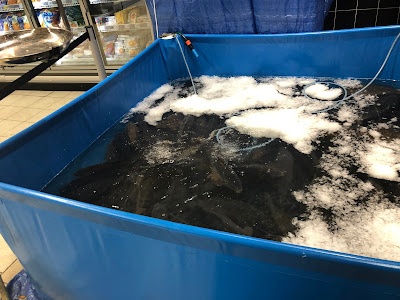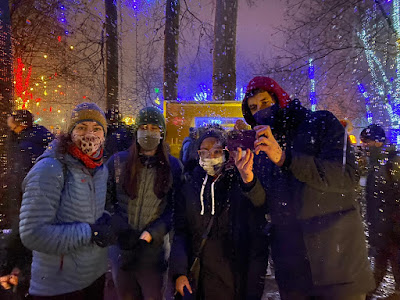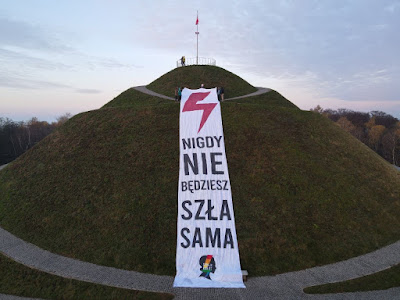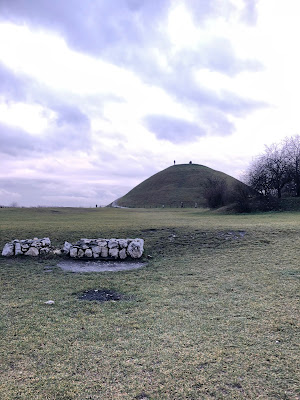That's right—I have decided to "retire." My dad thinks this is very funny and he now wants to start a podcast with me, him, and Grandpa discussing retirement across three generations. That probably won't happen (for many reasons, one being that Grandpa can't hear anything anymore) but it is true that I have quit my job and have no intentions of looking for a new one in the foreseeable future. While technically I'm still a PwC employee until the end of the month, I kept my already booked vacation days making yesterday my last working day. I am so excited and relieved!
Yes, I know that actively choosing unemployment is an indicator of my immense privilege. I battled managing that privilege the first time I was a housewife and this time I think it is even more apparent. All I can say is that I am very grateful this option is available to me, but beyond that I won't start another privilege rant here. You can surely see breadcrumbs in my previous posts if you care to re-read them.
I want to share the background of my time at work and why I ultimately decided leaving my job was the best choice for me. To do that, let me take you on the journey of my employment. *key dream sequence music*
Pre-PwC
When we first moved to Krakow I did not like being a housewife. I was bored, there was no structure to my days, and I had no social life. I didn't need a job for the money, but I wanted a purpose and a community to be a part of five days a week. At that point, too, I thought we would probably live in Poland for three or four years and the prospect of not working for that long was daunting. Even though I was beginning to doubt my previously gung ho resolve to stay in public accounting forever, it was the obvious choice to look for employment since my skillset would be directly transferable and I felt relatively confident they would hire an English-only speaker. Plus, I didn't want my CPA experience to atrophy. I interviewed with PwC on 24 October 2019, got a call the next day offering me the job (with the knowledge that my work permit would need to be approved before I could start working), and then I flew to the US for visa stuff on the 28th. This was all within three weeks of moving to Krakow, so pretty much since the beginning I was ~90% sure I would be working eventually.
I was told to expect the work permit approval process to take 3-6 months, so even when I was unhappy about my housewifing I always knew that it was temporary. However, in the four months between my interview and my start date I started to really enjoy the routine I set for myself. It was plenty of time to build up a social life, plus I think Cameron developed a reliance on me handling all of the administrative parts of life. Essentially, I decided that if the work permit didn't come through, I wouldn't actively look for another job.
First Impressions
I started at a weird time of year and in a weird position. Coming in mid-February (which also means mid-busy season) as an experienced senior does not lend well to traditional onboarding procedures. Yet, I still received all the standard corporate "welcome onboard" emails and I expected my first week to be pretty low-key; probably sitting in a conference room watching culture-infused training videos. Unexpectedly, two days before my first day I got a text message saying I should meet at the client's office, which of course put me into a little bit of a panic. It did get straightened out and I started in the PwC office on my first Monday morning, but I also ended up spending the second half of the day on the client site.
Right off the bat I was in charge of a few projects. I both liked that the team had enough confidence in me to give me those early responsibilities, but I was also overwhelmed because I was trying to prove my competence while trying to learn so many things from scratch. I had never worked on a for-profit client or in an IFRS environment and trying to catch the nuances while taking a trial-and-error approach to figuring out the general admin and PwC-specific methodologies was exhausting. I know I should have asked more questions early on, but everyone else seemed too busy to burden, plus I wanted to live up to the praise I was getting for being self-reliant and capable.
I also felt like I was a bit of a nuisance because I only speak English. Most of the time in the audit room people would talk amongst themselves in Polish unless I was specifically being drawn into the conversation. That's fine, but it is harder to passively pick up tidbits about your coworkers when you don't follow the rolling conversation. Perhaps if the general stress level was lower I might have been a more active conversation leader so I could insert myself into the discussions better, but probably not since I was still trying to learn my new workplace's etiquette. It might sound like I am complaining about my coworkers—I assure you I'm not—but I felt bad that I was interrupting their routine because I didn't know Polish. I'm not a particularly self-conscious person, but I do pride myself on my ability to fit in and not being able to converse in the "normal" way meant I didn't fit in as seamlessly as I would have liked.
Pandemic
I kept reminding myself that close connections take months, and I did feel like I was making progress connecting with the team. That progress slowed down significantly once we all began working from home, which was less than a month after I started at PwC. This was terrible timing because now the casual information gathering I did have was cut off. Working from home took away my ability to gauge "normal" working hours and daily productivity. I also could no longer call out to the room and ask, "does anyone know how to..." but instead I had to choose to impose my question on someone. The problem was I didn't have enough of a relationship with anyone yet to feel comfortable constantly pinging my problems to.
There were good things about working from home, though. I liked that I no longer had a commute and I could eat whenever I wanted (rather than waiting for the group to collectively decide it was lunchtime). It also made me very grateful to have a job. When Poland did a full lockdown I was so thankful to have something specific to focus on each day. There was also a lovely two month period of time where we were told not to work any overtime and I really liked working a true eight-hour workday. Like everyone else, my team figured out how to adjust to the virtual environment and I began to feel like I (kind of) knew what I was doing.
Stress & Anxiety
As is the nature of public accounting, as soon as you start to feel confident with one aspect of the job things are bound to change. Some key members of my team left PwC, leaving a handful of projects to be distributed amongst the remaining seniors. When available, people transitioned onto our team to fill in but it still meant more projects were falling into my lap. I didn't have a good sense of how long things would take, so when I was told I should be able to finish up part A today and get through parts B-D by the end of the week I would meekly agree that it seemed possible. But "possible," I learned, only happened in an ideal world and we were not living on that planet.
For example, the initial project I was assigned on my first day at PwC should have wrapped up in less than two weeks. It took me about double that time, partially because of the learning curve, partially because I was also trying to juggle other side projects, and partially because the client was not ideal. And that was only to mostly finish. There was one little holdup, and while I waited for that to be resolved I focused on other projects. Periodically, I would have a lull and would check in on the little holdup—sometimes I would be able to progress a smidge further but typically I was told, "it will happen soon." That little holdup stayed in limbo for months and months, and ultimately it never was resolved in the 10+ months at the job.
Some people would be able to brush that off with a "not my problem" attitude. I am not one of those people. I really care about my work and I work off a running checklist, so until something is truly done it lingers on that list indefinitely. Effectively that results in a very long list, and long to-do lists are really just a visual representation of increasing stress. Some weeks I did take those on-hold projects off the list, just to manage my stress a little bit, but even so I knew that if that one little piece came through it would be all hands on deck to finalize that project.
The workload was definitely the most potent ingredient in my personal anxiety cocktail, but it wasn't the only one. I started to be part of weekly calls with the client which were fully in Polish until it was my turn to speak; again, that's fine, except I couldn't gauge if I was using the right tone or saying the right things because I couldn't match the others. I was also learning that my options to get CPE (continuing professional education—a requirement for maintaining my CPA status) were very limited, which left me to seek out webinars outside of work. Essentially, I would take the same trainings twice–once for work and once for CPE—and the CPE ones would always be at weird hours (think 10 pm on a Tuesday) thanks to the time difference.
I also wasn't getting to enjoy my favorite part of my job, which is helping and teaching others. Yes, I periodically had an associate working with me whom I would guide via video chats, but most of the time I felt so bogged down with my own workload that I didn't feel like I could be an effective guide to others. It both helped and hindered having new people rotate onto our team as I could sympathize and commiserate with them about the onboarding process, but since I couldn't dedicate much time to them I also knew I was perpetuating the stressful cycle the "figure it out yourself" attitude creates.
Quitting Thoughts
There were some ups, but it seemed like the ups only came after a long series of downs. I had one project (which ended up expanding into three or four, but that's a different story) that we needed to finish by the end of August. I had many 12+ hour days leading up to 31 August… and then we didn't issue. Panic mode kept on rolling for another week and that's probably when I first started toying with the idea of quitting.
It took me a long time until I truly decided to quit, but I started testing out the idea with small things. I laid out my grievances to see which ones would be acted upon. My boss agreed I shouldn't work longer than ten-hour days, and I was tentatively granted a week off during busy season for a ski trip in the Alps. Also around this time, Cameron and I decided we would only stay in Krakow another year so I knew I would need to quit by mid-summer 2021 anyways. Every change (good and bad) helped to hone in on when in our 12-month scale I would quit.
My mood was souring and the urge to quit kept growing, especially as my expectations about project competition dates kept getting dashed over and over again and more and more of my coworkers quit. I'm pretty positive (even for an American) but I was having a harder and harder time maintaining a professionally cheerful attitude. I tried lots of remedies: meditation apps, gratitude journals, CBD oil, Bright Mood tea, and breathing exercise all supplemented my already daily exercise and weekly socializing routines. Although they probably helped to some extent, I still kept inching closer to the "quit now" side of the scale.
Decision Time
Even with my mood-lifting attempts I was still crying regularly. (Maybe another pro to working from home is that you can cry while you work and no one has to be the wiser?) Somewhere in the late September time frame everything compiled together and culminated in a panic attack. I was already starting to tear up thinking about the absurd number of things I needed to do when an email came through with another set of impossible tasks. I started to feel dizzy, I couldn't breathe, and I wanted to throw up. I made it to the bathroom where I sat on the toilet lid and leaned into the wall so that the cool surface could cool my now-sweating face.
I heard a statistic (that I will probably misquote) that Americans typically feel miserable for five years before they will seek out help. I was not willing to be an average American. At this point I tried my final maybe-I-won't-quit option and I made an appointment with a counselor.
I signed up via a counseling service that PwC provided. My call was in mid-October and I was a little hesitant to complain about work to someone provided to me by my employer. I quickly learned that the counselor I was matched with had no practical knowledge about what PwC does and I opened up about my complaints. I expected she would be a mostly passive listener who would leave me with some tips on how to manage my stress better. Somewhat to my disbelief, she seemed very invested in my plight and told me I wouldn't be able to thrive so long as I kept having to operate in survival mode. She adamantly agreed that I needed to fully disconnect from work, whether through quitting or via a psychologist-prescribed mental health sick leave. I set a time slot in my bosses' calendars for the next week to share my "2021 intentions."
Practicalities of Quitting
In Poland, if you have worked at a job for more than three months you have to give a minimum one month's notice. I wanted to give a full two months because I wanted my transition to go as smoothly as possible. I figured with two months they would be able to find my replacement and I would be able to finish up everything on my to-do list. On 27 October, I formally announced my intentions to only continue working for PwC through the end of December.
The reasons I gave for quitting were all sincere. I was truthful that the stress was negatively impacting my mental health and that I did not want to subject myself to a full busy season's demands. I shared that I wasn't getting some of the simple things I wanted out of this job (CPE, community) and that I wanted to ensure I had time to enjoy living in Europe. I admitted that I didn't feel like I was a good employee and that I constantly felt I was outputting at a mediocre standard. Another big reason was that I didn't feel like I was making the world a better place by auditing a huge telecommunications client. I know from my experience with nonprofits and tribal governments that I am willing to put up with a lot of shit if I feel like I am assisting with a greater mission of good.
I knew my announcement was a blow to my team, but amazingly everyone was happy for me and really supportive. I caught a glimpse of jealousy in some people—I'm sure quitting had crossed their minds at some point as well. I knew it would have to happen, but I still felt guilty as I watched my unfinished tasks being doled out to the few remaining team members. I wasn't sure how much to share, or how widely to share it, so I found myself giving cryptic responses to the client and some colleagues as the topic of 2021 planning came up in conversation.
The last few weeks were by no means a breeze, and in some ways they were the toughest weeks of the year. I think if I didn't have the knowledge that it would be over soon I probably would have had a second panic attack. At one point my manager asked if I would be willing to extend my time for a few weeks if the current projects didn't wrap up by the end of December. I snapped at him and not-so-politely said, "definitely not. I am fed up with this job. The reasons these projects are still ongoing are not my fault and I feel no obligation to fix the problems that other people made." Yes, that was not a shining moment, but I am happy to say I did fully wrap up the one huge project that everyone was most worried about on my last day.
Looking Back
I know that I did not handle everything ideally. From the beginning I could have been more open about my concerns and I could have been more upfront with my questions. I could have tried to better separate myself from my work and I could have been more demanding about my needs. I could have stayed for a full year. I could have played it out even longer and just kept at it until we moved. If I wanted, I'm sure I could have even kept going beyond that by transitioning from PwC Poland to PwC USA.
I could have, but I didn't, and that's ok. Clearly, I felt like there were plenty of reasons to quit, but I also had many reasons to stay which made the decision not-so-clear-cut: I like having purpose, I like making money, I care about my coworkers, I worry I'm unfairly attributing pandemic/politics/expat stresses to work, I pride myself on not being a quitter, I'm worried that a multi-month gap on my resume will make it harder to get a job, I also worry that my knowledge/skills/drive/critical thinking will disintegrate the longer I don't work, and biggest of all—I don't like disappointing people.
Quitting was hard and scary, but I'm really proud of myself for going through with it. When I was still debating with myself, one friend shared his story of quitting a job and the relief it brought him. That was the predominant emotion I felt, too. There was also excitement and anticipation but the relief is still so strong I'm almost giddy.
All that said, I am grateful for this job. As one coworker put it, "it was quite absorbing and particularly unusual," but I made good connections and I learned a lot. Many of the lessons learned were about myself rather than about audit and accounting, although there were plenty of those, too. I've finally admitted to myself that counter to popular opinion, I want to be a big fish in a small pond. Also, and probably more importantly, I now know that I won't be fully satisfied unless I connect to my work's mission. We'll see how those come together for my next act.
What's Next?
When I was feeling particularly frustrated and overwhelmed, one of my outlets was to fill out two lists: 1) other things I could do with my time, and 2) other jobs I could consider. I won't look for another job while I'm in Poland. For one, I don't really have time to go through the job permit process, but also I don't really know what I want to do next. Some of my other jobs are accounting- and finance-related, but I also have a few wacky ones on there, too. My favorites are: environmentalist, party planner, licensed joyologist, dating advisor, and local government official/mayor. Before I commit to the next phase of my career I want to take this time to truly figure out what I want to do and what I require out of a job. I'm considering this my first retirement since it will be a time to reflect, relax, and recoup.
Although I don't have a title to give myself at the moment other than "housewife," I don't think I will be wearing the stereotypical housewife heels and pearls this time around. This time, housewifing is completely my choice and I have a plan! I anticipate splitting the average day into segments: three hours for life planning, three hours for education, two hours for reading, and one hour of exercise will make up my workday. I have a few big personal projects that I've been daydreaming of for months now and I'm excited to finally get started on them. I'm also offering my services as a copy editor, resume reader, mock interviewer, vacation researcher, and old undies mask maker.
I may not know exactly where I'm going next, but I know I made the right choice for me right now.
Just a pretty photo from one of Wawel Castle's archery holes. I suppose you could apply some related inspirational message like "bright look at the future" to make the photo fit the theme, if you want to.
One week I had three late nights of CPE in a row. I started to watch the webcasts from the bathtub to try and decrease my stress levels even though it still felt like I was working at 10 pm.
The doodlings of an unhappy employee.
I wasn't kidding when I said I would make you a mask out of your old underwear, but no promises that they'll look very good. I can promise, though, that I'm a pretty good resume editor and proofreader.





































































